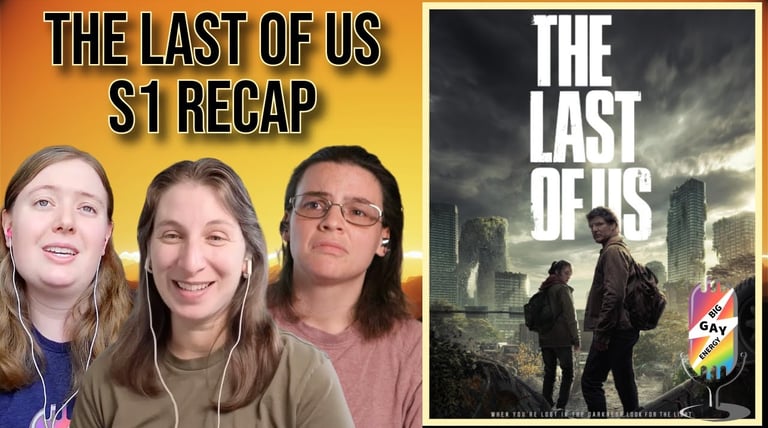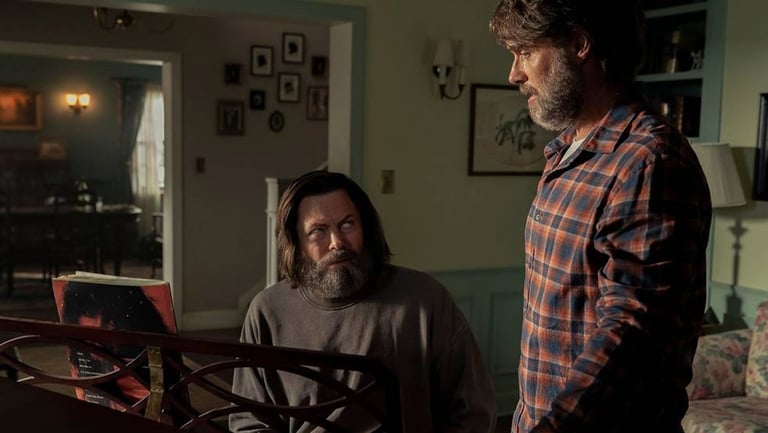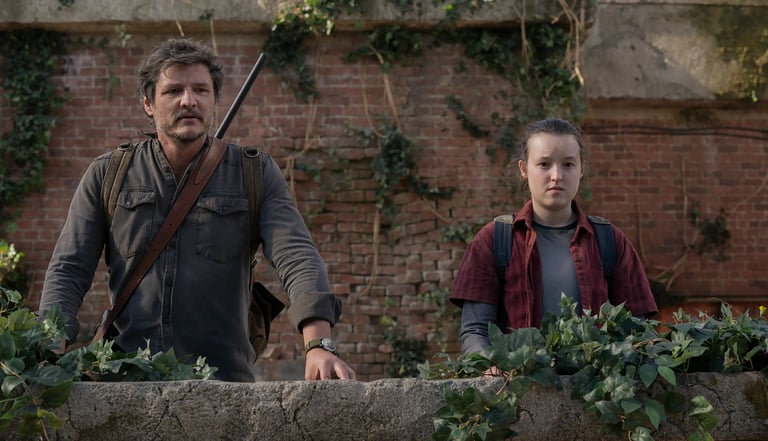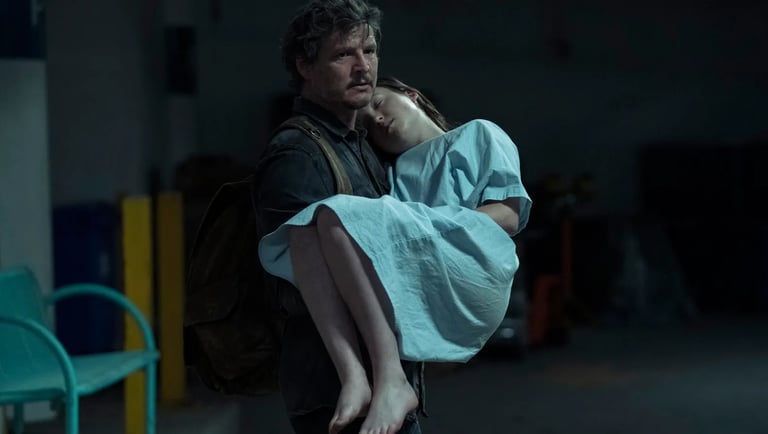How The Last of Us Season 1 Reinvents the Apocalypse
Deep dive into The Last of Us Season 1—how plausible fungal science, lived-in worldbuilding, and tender queer storytelling make the apocalypse feel human.
DISCUSSIONTVTHE LAST OF US
Big Gay Energy
9/13/202510 min read
Why Season 1 Works
At its core, The Last of Us asks a deceptively simple question: how do humans behave when everything familiar has been stripped away? The show gives a thoughtful answer by doing three things especially well. First, it grounds the apocalypse in plausible science, namely fungal infection and the way that fungi can alter behavior. Second, it treats the post-collapse world as a place with many possible human responses. And third, it cares about rest and small lives as much as it cares about the central quest of getting Ellie to people who might be able to help.
Viral or fungal apocalypse stories can easily fall into two traps. One is using the catastrophe purely as an excuse for action sequences. The other is ignoring the logistics of what a pandemic would actually do to institutions and communities. This season avoids both traps by folding in worldbuilding into its character moments. The result is a story that feels lived in, where every settlement and every person we meet has a little logic for why they survived the way they did.
Worldbuilding That Breathes
We loved how the show gives us pockets of America, each with its own social logic. Jackson operates like a functioning commune where people trade labor and share purpose. Fedra reads as authoritarian rule, built in the name of order but leaving people feeling like cogs. The Fireflies are ideological and militant, promising meaning and a project for the desperate. Then there are the raiders and slavers, the groups that survive by preying on others instead of building anything at all.
These different responses are not just wallpaper. They shape choices, loyalties, and the stakes of what Joel and Ellie are up against. When Bill writes about choosing one person to protect, it lands because that sense of purpose is exactly what keeps people going in each of these systems. That motif keeps repeating and anchors the emotional rhythm of the season.
Queerness as Life
One of the biggest, and most joyous, surprises in season one was how the show expanded queer representation without it feeling gimmicky. The game included hints, but the series had the time and space to really let relationships breathe. Two episodes in particular showed different facets of queer life under collapse.
Bill and Frank: Love That Ages
The Bill and Frank episode is an absolute standout for us. Casting Nick Offerman as Bill is one of those inspired moves that flips expectations. Bill is a hardened survivalist, the kind of character who would normally get a smirk and a few lines in a post-apocalyptic story. Here, we get his full arc. We meet Frank, and we watch a man who lives by booby traps and logic slowly soften into joy and care.
The piano scene is a perfect example of why expanding the story matters. A single song, sung by someone who has been isolated from music for years, becomes this incredible moment of recognition. Bill says something to the effect of he has no girl, and Frank understands exactly what that means. There is no forced coming out scene. There is just the quietness of two adults recognizing the same truth.
Then there are the strawberries. That little sequence, where Frank trades a gun for strawberry seeds, hides the patch, and then surprises Bill, is so rich with meaning. A fresh strawberry becomes a ritual and a measurement of a life they built. The lighting, the close-in shots, the way they eat slowly like it is sacred food, all of it communicates tenderness. Bill telling Frank that he was never afraid until he met him, is the hearth that warms the rest of the season. It also foreshadows what Joel will later do when he gets his chance to protect someone again.
Their ending is complex and earned. Frank is in pain from disease. He chooses a peaceful exit, and Bill honors him by giving him exactly the last day he wanted. That culminates in Bill's line about being satisfied, that his purpose was Frank. It is one of the most humane moments in an otherwise brutal world.
Ellie and Riley: Curiosity, First Love
Episode seven, that mall date with Riley, is a different type of queer storytelling. This is a slice of teenage joy under collapse. We get what it is to grow up queer when the normal rites of adolescence do not exist. The show makes the mall sequence both playful and devastating. There is a real tenderness to Riley designing an afternoon of small wonders for Ellie. Escalators, an arcade, all those tiny human moments feel huge because there are so few of them.
Riley choosing the Fireflies is a turning point, and it hits Ellie as betrayal because of everything she has already lost. That layered reaction is one of the reasons we feel so much for Ellie across the whole season. Her short romance with Riley is not tokenistic. It develops and complicates Ellie in a way that feeds directly into the central story of why Ellie wants meaning and why she later seeks the Fireflies.
Small Stories, Massive Weight
We keep saying "slice of life" because the show gives characters pauses and breathing rooms. Those stops are not filler. They are how the season makes us care. Bill and Frank, Henry and Sam, even a few minutes with the Jackson community, they all add up. Those pages of life we are shown make the violence and the choices feel consequential.
Henry and Sam: Representation and Heartbreak
Henry and Sam do something the game did not, by making Sam deaf. That addition is not window dressing. Sam's quietness and his bond with Henry highlight the ways children and people with disabilities navigate the new world. Their scenes with Ellie are tender and haunting, especially because we watch Ellie try, hope, and fail to save a friend. The kid's optimism and the way Ellie offers herself, by trying to treat Sam with her blood, cuts deep.
Episodes That Stay With Us
There are a handful of episodes that we still think about, each for different reasons.
Episode 1, the opener. Starting through Sarah's eyes is a masterstroke. We are anchored in the innocence that is about to be lost. The way mundane details like missing pancake mix save Joel and Tommy feels chilling in hindsight. The episode contains the emotional beat of Joel losing his daughter, which shapes everything he does later.
Episode 3, Bill and Frank. Intimate, queer, funny, devastating. This is the one many of us rewound and rewatched because it felt like a miniature film with its own rhythm.
Episode 7, Ellie and Riley. Teenage joy in an abandoned mall, and then the pain of Riley leaving. Sweet and savage at once.
Episode 8, David and the unsettling cannibal cult. This installment is disturbing in ways that linger. The sound design during the dinner scene is purposely jarring, the cutlery becoming nauseating, the atmosphere thick with threat. The show escalates from unease to visceral danger and the payoff is brutal.
Sound, Music, and Filmmaking Choices
The way the creators used music and camera work deserves special mention. Music functions like memory and thread throughout the season. A melody from Bill and Frank’s first meeting plays again as Joel and Ellie leave town, reminding us that love and sacrifice ripple across lives. Small callbacks like that make the storytelling feel hand-stitched.
The filmmakers also leaned into video game aesthetics at points. The camera often frames the action as if we are inhabiting a playable character’s perspective. That choice, especially in the car sequences during the early chaos, gives an intimacy to the survival. We felt transported into a playable space, while still benefiting from cinematic craft.
Performances and Casting
Casting choices were thoughtful. Pedro Pascal as Joel carries the grief and grit. Nick Offerman as Bill gave a performance that moved from brittle to tender almost without you noticing. The guest actors, from the cannibal cult leader to the people who fill Jackson, are consistently excellent. We noticed a meta detail that made us smile. Several voice actors from the game appear in cameo roles in the series. Those nods are like little winks to longtime fans, while being perfectly optional for viewers who only saw the show.
Realism and Medical Questions
One of the things we talked about at length is the depiction of the fungal premise. Having an infectious disease specialist in our group gave us a lens. The way the show clocks the science, and the chilling scene with the mycologist in episode one, make the premise feel frighteningly plausible. Fungal infections are often underappreciated threats. The scene where a scientist finally says there is nothing to be done, and asks to go home, is gutting because we have all seen experts give hard truths and be begged to hope despite the evidence.
We also had a lot of questions about the hospital climax. Why was Ellie unconscious on the table? Why would the medical team choose to operate without trying as many noninvasive tests as possible? There is a narrative logic to being forced into desperate choices, but it also creates ethical problems in the story. The Fireflies' plan assumes Ellie will consent to a fatal operation to save everyone else, and that assumption, plus the secrecy of it, takes agency away from her. That removal of agency is exactly what makes Joel’s final response so visceral, and morally fraught.
The Ending: Joel’s Choice and the Moral Rub
The finale is the moment people argue about most. Joel goes into the hospital to retrieve Ellie, and by the time he gets there, the decision feels immediate. Joel chooses to save the girl he has come to love like a daughter, even if it means killing a group that believes that Ellie’s death could save countless others. We understand why he does it. Joel’s grief was never resolved. Ellie is the person who finally resurfaced something like purpose for him. To lose her to a faceless calculus of survival is a blow he cannot take.
We are not defending the logistical consequences. The Fireflies are one of the few organizations actively trying to solve the root cause. Killing the surgeon and dismantling that team closes off a potential path for humanity. The show forces us to sit with that paradox. That is its power. It refuses to give a tidy answer. Instead, it asks: how much of our humanity are we willing to gamble when we are afraid of losing what we love?


Who Are the Monsters?
This is a question we kept circling. If the infected are a fungal organism trying to survive, then they are driven by a biological imperative and not malice. The real moral monsters in the story are sometimes the uninfected humans who choose violence, exploitation, and cruelty for power or comfort. David and his crew are an obvious example. They are predators, deliberately taking advantage of a chaotic world. Slavery, cannibalism, sexual violence, raiding, and scapegoating are all human choices that show how the collapse can reveal monstrous tendencies that were present all along.
That contrast is where the show is at its best. It makes the infected terrifying and dangerous, but it also holds up a mirror and asks whether humans, left to our worst impulses, might be just as devastating. Which of those outcomes do we want to be remembered for? That is the nightmare The Last of Us wants us to contemplate.
COVID, Viewing, and the Fright of Plausibility
We talked in the episode about how living through a real pandemic changed the way we watch fictional epidemics. There is a heightened sense of dread because the conceit is not implausible extras. The show’s small, detail-oriented decisions mimic the experience we had during COVID. Warnings ignored, conflicting authorities, the uneven distribution of resources, and the politicization of public health, all of these felt familiar and therefore uncomfortable.
That familiarity does something important. It drains the melodrama from the show. Instead of being purely fantastical, it becomes a reflection of our own political and social failures. The Last of Us is, in part, a cautionary fable about the costs of failing to act collectively.
Representation Wins We Loved
There are small choices that feel like wins for representation. The show allowed women to age naturally without erasing gray hair, which reads as both realistic and respectful. It gave queer middle aged men joy and intimacy. It put disability into the frame in meaningful ways. These are the cumulative details that make the world feel like ours, with its messy diversity and contradictions.
Production Notes That Elevate
Makeup, prosthetics, and creature work are outstanding. The infected are horrifying and worked with with a dedication that made them feel organic rather than campy. The clickers, the bloated infected, the spore growths, all of it was designed with texture and thought. Even small production choices, like filming in an actual defunct mall, added authenticity that is hard to fake.
Final Thoughts
Season one of The Last of Us is rewatchable because every time you return, you notice a new stitch in the tapestry. It is an emotionally rigorous show that refuses easy verdicts. It celebrates tenderness and queer love in ways that feel earned, and it confronts the ethical mess at the heart of survival stories. The creators respected the source material, and they also used the television form to expand where the game could not.
We left our conversation on a note that is both soft and furious. Soft, because we will always come back to Bill and Frank eating strawberries and holding hands. Furious, because the season forces us to consider whether we, as a species, will ever be capable of the collective thinking needed to solve the real calamities we create for ourselves.
Questions for You
We want to hear from you. If you could give any character a side quest or a little extra storyline, what would it be? Would you want an episode from Marlene’s POV to understand what the Fireflies were actually doing? Would you follow the giraffes and their escape from the zoo? We asked this in our episode and it led to some delightful ideas, so we want yours too.
Closing
Season one of The Last of Us is a rare adaptation that both honors its game roots and expands into something new and cinematic. It is an adult story about the messy ways humans act under pressure. It is queer, tender, violent, thoughtful, and frequently heartbreaking. We loved it more than we can easily say, and we will be talking about it for a long time.
Hydrate for Lesbian Jesus, and gay it up all over the place.








